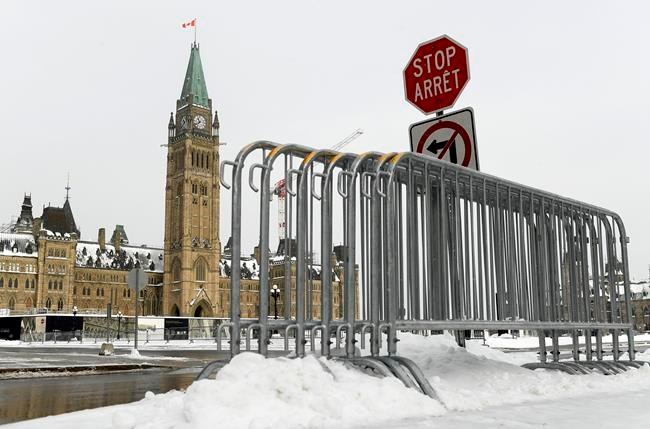OTTAWA — As Ottawa marks one year since the "Freedom Convoy" arrived in the national capital, Prime Minister Justin Trudeau said he understands the anger and concerns protesters have while also promising "good, long-term jobs" as a way to relieve pressures Canadians are facing.
Dozens gathered outside Parliament on Saturday to mark the anniversary as members of the Liberal party were attending their caucus retreat discussing their upcoming priorities for when the House of Commons resumes Monday.
"We can feel it, how times are tough right now. We have a global economic slowdown, combined with inflation, combined with higher interest rates," Trudeau said Saturday before meeting with Liberal MPs.
"A lot of people are feeling a lot of pressure."
Trudeau said he expects there to be a global economic slowdown for the next six to 12 months, but promised his Liberal government would provide more targeted supports without adding to inflation.
He said the Liberals and New Democrats want the same thing heading into the next sitting, like expanding dental care.
Other shared priorities under their confidence-and-supply agreement include pharmacare legislation this year, and the introduction of a "just transition" bill to help create a green economy that has protections for energy workers built into it.
Minister of Natural Resources Jonathan Wilkinson said he prefers calling it a "sustainable jobs" bill because that's what it's meant to create. He said in the next few months his government will introduce further policy on green technology projects, with a bill coming within the year.
Industry Minister François-Philippe Champagne said the government is just getting started when it comes to job creation within the green energy sector, touting recent industrial investments in Ontario.
Last year Champagne announced his government is giving $259 million to General Motors of Canada in Oshawa, Ont., to advance electric vehicle manufacturing. The government says the investment will result in thousands of jobs.
"I would say last year was the appetizer. The main course is this year," Champagne said Saturday.
He said "having a good job" is the best for combatting inflation, promising that "we'll have even more for Canadians" this year.
Trudeau said part of his government's agreement with the New Democrats, which was signed last March, "is about creating good long-term jobs into the future."
"Canada is well positioned for the coming years, and we have to pull together the way Canadians do during these difficult times," Trudeau said.
"That's what I look forward to doing in Parliament, and quite frankly that's what I know Canadians will do. In tough times we pull together. We don't throw up our hands and say everything is broken."
Trudeau was referencing Pierre Poilievre who said "everything feels broken'' in Canada when the Conservative leader addressed his caucus on Friday.
Canada's economy is facing a "turbulent" year but the federal government still has some spending room for big priorities like a new health-care deal with the provinces, Associate Finance Minister Randy Boissonnault said earlier this week at the Liberal cabinet retreat in Hamilton.
On Feb. 7, Trudeau is set to meet with Canada's premiers to discuss further health-care funding, but the amount is still unclear.
"We'll find out in about eight or nine days from now," Health Minister Jean-Yves Duclos said Saturday, which marked the last day of the Liberal caucus retreat.
The government will also table legislation this year related to pharmacare and long-term care, Duclos said.
On Monday, all members of Parliament will return to the House of Commons, where they are set to debate enshrining a national child-care system into federal law.
Ottawa has struck deals with provinces and territories to reduce child care across Canada to an average of $10 a day by 2025-26.
The government says bringing the deals into a national child care law will ensure the system remains in place for the future.
MPs will also study Bill C-13, the official languages act, during a committee meeting on Tuesday.
The proposed bill is aimed at fostering and protecting the use of French in federally regulated private businesses in Quebec, but it has been criticized by anglophone communities in that province.
Official Languages Minister Ginette Petitpas Taylor said if the bill were to pass, it will not result in anglophones losing any of their rights.
"We recognize that French is in decline in this country and we can't minimize that. That is the reality," she said Saturday.
"Our official languages legislation is also put in place to make sure that we respect and protect our official language minority communities, but that also includes anglophones in Quebec."
This report by The Canadian Press was first published Jan. 28, 2023.
Mickey Djuric, The Canadian Press



